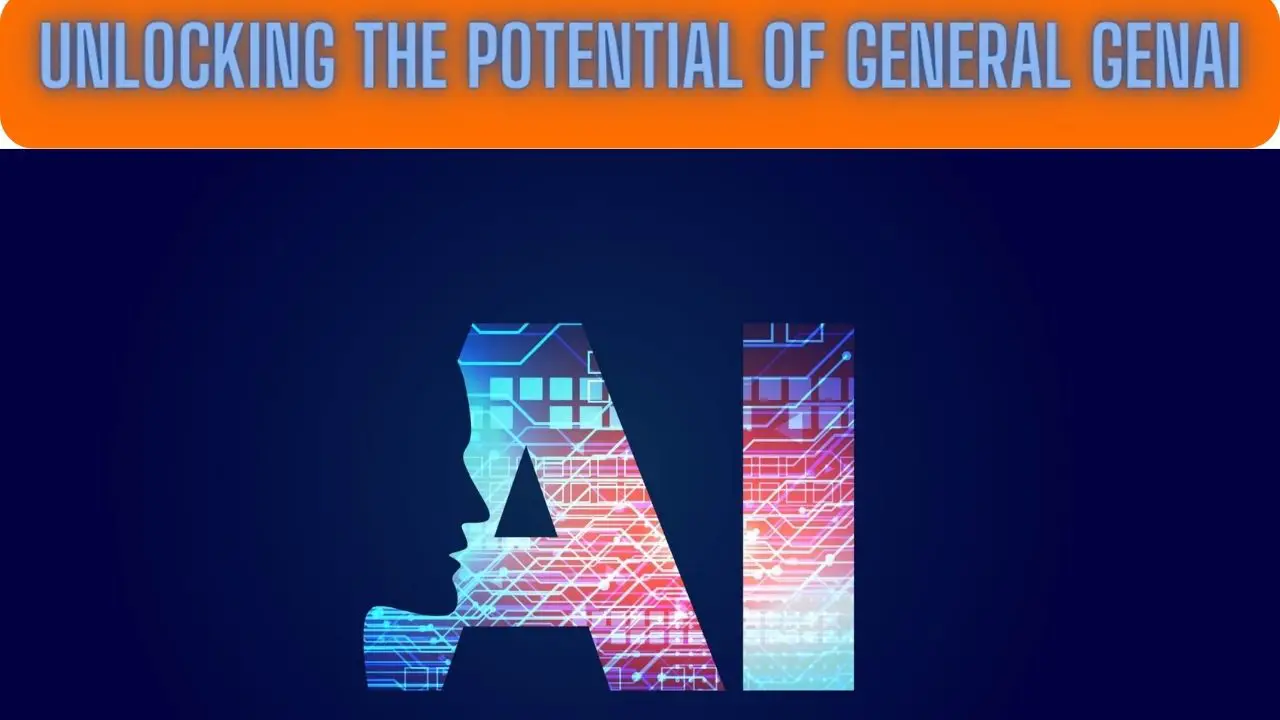Unlocking the Potential of General GenAI: A Comprehensive Guide
Artificial intelligence (AI) continues its rapid advancement, and General Gen AI has emerged as a disruptive innovation, offering wide-ranging capabilities and applications beyond what traditional AI systems can do. Boasting versatility, adaptability, revolutionizing industries, and potential disruption, General Gen AI looks poised to alter future technological development and human-machine interactions. We will examine its intricacies, including definition, capabilities, applications, impact on industries’ ethics, prospects, and broader societal ramifications. In this comprehensive guide, we explore General Gen AI, including definition capabilities, applications, impact on industries’ ethics considerations, prospects, and any possible ramifications from General Gen AI technologies that emerge.
Understanding General Gen Artificial Intelligence
Explore comprehensive General Gen AI info to stay updated on the latest advancements in artificial intelligence.
General Gen AI represents a significant advancement in AI technology. Where narrow AI was limited to performing specific tasks within one domain and Artificial General Intelligence (AGI), with its goal of mimicking human-level intelligence across all fields, General Gen AI occupies its spot on the AI landscape by being capable of performing numerous tasks across several domains with great adaptability compared to its predecessors.
General Gen AI stands out because it can learn from diverse datasets, adapt to new environments and tasks, generalize knowledge across domains, and attack complex problems quickly and precisely.
Capabilities And Applications
General Gen AI offers numerous capabilities across numerous domains and applications, some of which are:
- Natural Language Processing (NLP): General Gen AI excels at understanding and producing human languages, making possible applications such as translations, sentiment analysis, chatbots, and virtual assistants.
- Computer Vision: General Gen AI can analyze and interpret visual data found in images and videos for tasks like object recognition, image classification, facial recognition, and autonomous driving.
- Predictive Analytics: General Gen AI utilizes advanced machine learning algorithms and techniques to process large datasets rapidly, identify patterns within them, and predict future events for applications such as predictive maintenance, demand forecasting, and risk evaluation.
- General Gen AI offers autonomous decision-making abilities for complex inputs and criteria, making applications like autonomous robotics, automated decision support systems, and adaptive control systems possible.
General Gen AI applications span across a wide variety of industries and sectors. Healthcare institutions rely on it for medical image analysis, disease diagnosis, personalized treatment planning, and drug discovery; in finance, it powers algorithmic trading, fraud detection, credit scoring customer segmentation, whereas manufacturing facilities use it to enhance predictive maintenance quality control supply chain optimization robotic automation among many other tasks – just some examples of the ways General Gen AI has been revolutionizing industries by streamlining processes increasing productivity driving innovation!
Impact on Industries
General Gen AI’s impact on industries has been immense and revolutionary. Utilizing advanced algorithms, deep learning techniques, and big data analytics tools, organizations can take advantage of new insights gained through advanced algorithms, deep learning techniques, and big data analysis techniques to automate repetitive tasks more quickly while making data-driven decisions more efficiently and accurately. General Gen AI revolutionizes healthcare and patient care through early disease detection, customized treatment planning, and remote monitoring capabilities. Finance has disrupted how services are delivered and consumed with applications like robo-advisors, algorithmic trading platforms, and fraud detection systems. In contrast, manufacturing has transformed through predictive maintenance, quality control measures, and autonomous robotics.
General Gen AI adoption has spread quickly across numerous sectors, from retail and transportation to energy, agriculture, and more. Its capacity to efficiently process vast amounts of data to identify patterns and make intelligent decisions can disrupt current business models while spurring innovation and opening doors to expansion opportunities and growth.
Ethical Considerations
While General Gen AI offers great promise, its use comes with ethical considerations that must be carefully assessed and met head-on. Such issues as privacy, bias, transparency, accountability, job displacement, or social impacts must be considered before deployment is considered complete.
- Privacy and Data Security: As organizations collect and utilize large volumes of data, privacy and security concerns arise. Therefore, organizations must implement comprehensive data protection measures to secure sensitive information while meeting regulatory compliance.
- Bias: Artificial Intelligence systems may contain algorithmic bias that leads to unfair outcomes and discrimination, making it essential to address bias in data, algorithms, and decision-making processes to guarantee fairness and equity in decision-making processes and outcomes.
- Transparency: Maintaining transparency within AI systems is integral for building trust with stakeholders and understanding how decisions are reached. Organizations should endeavor to make their models and algorithms explainable to stakeholders.
- Accountability: As AI systems become more autonomous and decision-making moves to an individual or decentralized structure, establishing accountability and oversight mechanisms is becoming ever more critical to guarantee their use responsibly and ethically.
- Job Displacement: There have been rising concerns of job displacement as automation and AI technologies replace specific human tasks or roles with automated ones, prompting socioeconomic ramifications of deployment of such technology and investing in upskilling initiatives to mitigate any negative ramifications on workers. Investigating workforce members, it is vital to investigate potential societies’ vital economic implications before investing in AI deployment.
- Societal Impact: Artificial intelligence technologies could have far-reaching societal repercussions, from employment patterns and income distribution through healthcare delivery and education delivery to benefits distributed equitably throughout society. Thus, AI deployment must be conducted carefully, considering its broader societal effects and ensuring equitable distribution of its benefits among members of society.
Addressing ethical considerations requires collaboration from policymakers, industry leaders, AI researchers, and ethicists who aim to establish guidelines, regulations, and best practices that support responsible AI development and deployment.
Future Prospects
Prospects for general AI are bright. As technology and AI capabilities advance, General Gen AI should play a pivotal role in shaping society, technology, and human-machine interaction of tomorrow.
- Emerging Trends: Explainable AI, federated learning, and human-AI collaboration present new opportunities for innovation and research within general AI. Explainable AI seeks to make AI systems more transparent and interpretable by users so they can better comprehend why decisions made by AI systems were made. At the same time, federated learning facilitates collaborative model training across devices to protect data privacy. Human-AI Collaboration involves harnessing the complementary strengths of both humans and AI systems to solve complex problems and make well-informed decisions.
- Integration With Emerging Technologies: When combined, General Gen AI with other emerging technologies like blockchain, IoT, and AR has the power to unlock innovative uses and applications across diverse domains. For example, General Gen AI could help analyze and interpret IoT device data, create smart cities, connected healthcare systems, and intelligent transportation networks, and enhance user experiences through contextual recommendations, personalized content delivery, or interactive interfaces – to name only some use cases!
As General Gen AI continues its rapid progress and maturation, investing in research, development, and education to harness its full potential while mitigating risks or potential issues can open new paths of progress, innovation, and social advancement. By welcoming General Gen AI responsibly into society, we can unlock many exciting possibilities for progress, innovation, and social advancement.
Conclusion
Overall, General Gen AI represents an impressive advancement in the evolution of artificial intelligence. Thanks to its extensive capabilities and applications, General Gen AI may revolutionize industries, spark innovation, and shape the future of technology – but to do this responsibly while mitigating any associated risks is vital for realizing its full benefits while mitigating risks as much as possible. By responsibly using General Gen AI, we can unlock new avenues of progress while building a brighter future.







